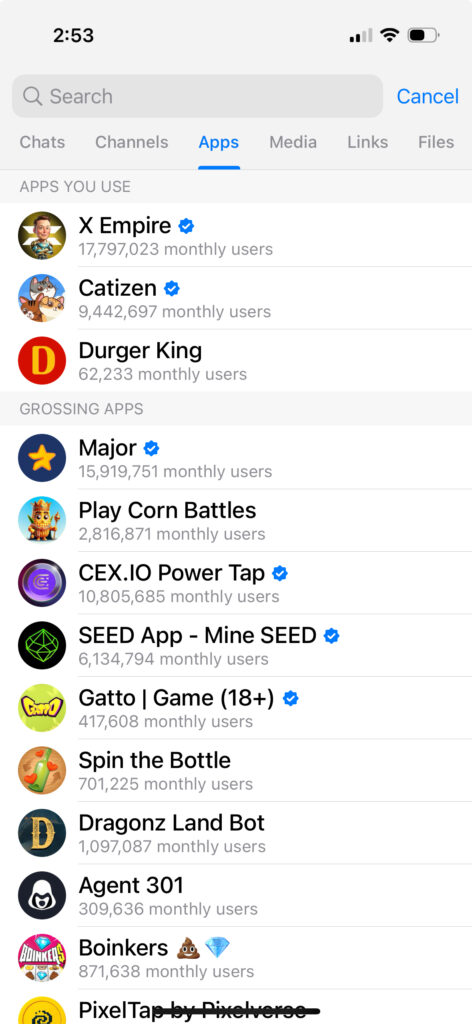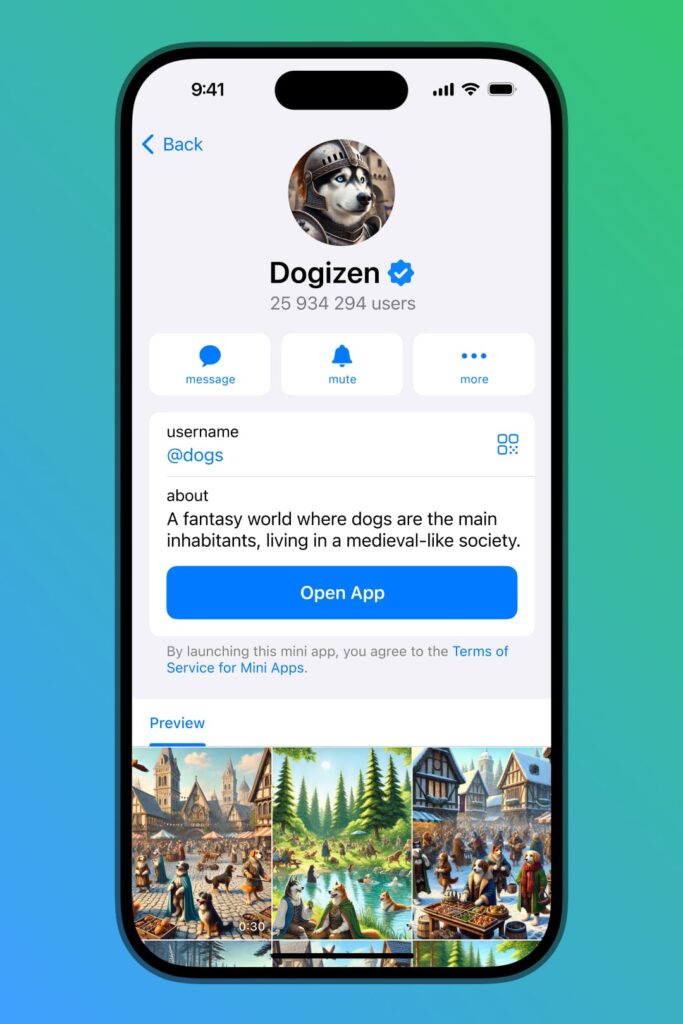The traditional app store model is under attack from both above and below
The app store model is exploding in front of our eyes, under siege by both macro factors (government regulation) and micro factors (mini app stores). In effect, the App Store and Google Play are being eaten from both sides: above and below. But the explosion of the 2010’s era app store model is hard to see because it is mostly happening in extreme slow motion.
We’ve all seen the Digital Markets Act maneuvers in the EU in which Europe is exerting control over how Apple and Google do business in that part of the world. This will take years and cost billions in legal fees before we reach a new equilibrium.
At the same time, however, mini app stores in multiple apps are starting to be a really, really big deal. In fact, 2 have just surpassed the 500 million monthly average user threshold in different ways.
WeChat & Telegram: 2 mini app stores with 500 million MAUs
We’ve known for years that mini-apps, or mini-programs, are huge on WeChat. It’s hard to imagine scenarios where most of its 1.35 billion users aren’t using mini-programs to buy products, order food, or get relationship advice.
But it’s not just apps anymore: it’s games, too.
In July we learned that 500 million active users are playing games within WeChat in mini-programs.
In fact, games now account for 15% of WeChat’s overall advertising revenue: an impressive and growing proportion which jumped during Covid — like games in the west — and which WeChat can continue to augment by directing user attention and behavior towards on-platform WeChat gaming.
240 of these WeChat mini-games have generated at least $1.38 million in quarterly revenue in the past year, says Technode.
While WeChat was always going to be a poster child of the in-app mini-app phenomenon, there’s a newer contender for super-app status: Telegram.
Telegram has in-app programs too in its mini-app store. And it has almost a billion users to present them to.
Hit the search tab, tap on apps, and you’ll see the most popular ones while being able to search for thousands more. All of them are tiny web apps, essentially. Built with Javascript, they work both in Telegram’s mobile and desktop apps, and have access to payments, messaging, and wallet capabilities.

Developers of Telegram mini apps can add app listing pages in a roughly analogous way to Google Play or the iOS App Store, with videos, screenshots, and blurbs about their apps.

Some of Telegram’s mini apps have close to 20 million users. And more than 500 million of Telegram’s users use a mini-app on Telegram every month.
Mini-apps and Apple’s App Store guidelines
In case you are wondering, mini-apps are actually perfectly fine by Apple’s App Store guidelines, within some boundaries, as specified in guideline 4.7:
- They can’t use their own in-app purchases infrastructure
- They can’t use native platform APIs
- They can’t get data or privacy permissions from the parent app without user consent
- They must filter objectionable content
- They must follow all privacy guidelines
Note that the parent app takes some risk here.
The developers of the parent app “are responsible for all such software offered in your app, including ensuring that such software complies with these Guidelines and all applicable laws. Software that does not comply with one or more guidelines will lead to the rejection of your app.”
This change happened around 2020 as WeChat charged ahead with its mini-program strategy … probably thanks to WeChat being too big in China for Apple to raise a fuss.
The app store model under attack from above and below
Mini-apps and mini-programs add third-party functionality to parent apps or super apps, rendering the super app increasingly important in a smartphone owner’s use of their device, and boosting the parent app to higher and higher levels of usage.
Since a person’s time allocation is generally a zero-sum game in which an activity that gains time steals it from another activity, that makes both the official App Store or Google Play and the default smartphone experience less critical and less central.
As such, mini apps and mini programs take power away from the underlying platform owners and give it to the super apps, which are in turn setting themselves up as platforms.
That’s powerful, because generally the platform closest to the user gains the most rewards.
This innovation is happening quickly compared to the legislative process which is slowly cracking open the mobile software publishing castles that Apple and (to a slightly lesser extent) Google have built.
We knew 2 years ago that the DMA would change app stores as we know them.
But despite EU action and initial platform response early this year, nothing has really changed yet. Likely there will need to be several rounds of negotiation, legal action, and legislative action before the EU gets what it wants: more free and open third-party developer access to the 2 major global mobile platforms.
Of course, this is not just the EU.
Many countries are doing similar things at various stages, in either legislation or regulation:
- U.S.: Open App Markets Act
- South Korea: Telecommunications Business Act Amendment
- Japan: Fair Trade Commission Guidelines
- Australia: Australian Competition and Consumer Commission
- India: Competition Commission of India
- UK: Digital Markets Unit
As this evolves, we’ll likely see major digital brands start to test more innovative ways of bringing their services to consumers.
Evolving marketing needs
As all that happens the growth tech stack needs to evolve significantly.
Right now, it’s becoming more critical to get analytics for WeChat mini-programs that might be driving tens of millions of dollars of revenue for retail brands. The same is true for user or client acquisition and monetization. And while there are some options for WeChat, Telegram is an even newer mini-app platform with fewer obvious analytics solutions.
Now think about multiple app stores or direct app downloads, and what services like SensorTower or Apptopia will need to do to provide mobile ecosystem analytics. Or what Singular will have to do to provide growth insights.
It’s an interesting, challenging, and very different world that we are entering. There’s a lot to be concerned about and prepping for.
The good news is that the big changes, the app store level changes, are slo-mo.
The mini-app revolution, however?
Not so much.
Stay up to date on the latest happenings in digital marketing


